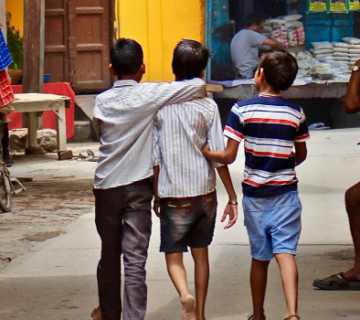Beating an addiction to gambling is possible, but not alone. Here’s the story of Christian Rigor from the Philippines, who found God at Fazenda da Esperança, as well as his life’s deepest meaning.
The idea of “aiming high brings to mind various things: work objectives, personal projects, dreams worth fighting for. They are often all-embracing challenges that we dedicate a good part of our lives to.
Yet there are goals and then there are goals; some have a more subjective value than collective. To reach loftier goals you have to follow a path of growth, put yourself in question, develop a sense of responsibility for the collective and open your horizons to faraway worlds.
Then there are lesser goals that turn us inwards, that close a person within their own self-interest, isolate them and eventually become destructive.
The objectives we choose guide our way of life. Although you can always change which path you’re on.
Christian Rigor, a 30-something from the Philippines, knows this well. A peaceful childhood in a well-off family allowed him to study and specialise in Europe. As a teen he had a full social life, but he wanted to make “easy money”, without working for it. His taking things lightly was fatal from the first moment he entered a casino.
Thus began his road to gambling addiction, caught in his need to recover his inevitable losses. It was a dark chapter of his life, aiming for misplaced goals. Along the way he lost friends, work, a fiancé, and the trust of his relatives. He also lost his personal wellbeing, which from the edge of the 24th floor of a building, reached its lowest point.
The turning point came when, encouraged by his mother, he decided to move to Fazenda da Esperança, a project with houses set up throughout a number of countries around the world. In its DNA is the Focolare’s spirituality of unity., which inspired its founders. The rehab programme there is dedicated to people who suffer from various forms of dependency.
“During the programme I learned to look beyond myself, beyond my egotistical and superficial worldly desires, and live for a greater goal. I learned to aim high and found God. That’s how I learned how to love God and those around me, in everything that I do in the present moment, even when it is painful or difficult.”
At Fazenda da Esperança, life is organised in three dimensions: spiritual, collective, and work. Each provides an opportunity to grow personally.
“As a Catholic, I learned to go deeper in my personal relationship with God, to listen to his word and live it, to look for unity with him at Mass and to pray as if speaking with a friend.”
Collective life taught him that to “love God fully, I need to love those around me, to see the presence of Jesus in them.”
It trained him to go beyond differences to serve each neighbour – sharing food, listening to friends who were down, taking care of things at home. At work, whether particularly heavy or just normal, Christian learned to give the best of himself.
“I didn’t care how difficult, physically taxing, boring, dirty or gross it was.”
Along his road to recovery, he was called upon to be a coordinator for his group. “It was difficult for me to be both gentle and firm, especially during arguments. One time I was unjustly accused of stealing, and I did not feel appreciated. I wanted to give up, but then I decided to stay because I wanted to heal my addiction and be a new person. I dove into loving in each moment, despite others’ judgement. I asked God for help and I felt closer to him.”
Today Christian takes on the challenge of his life beyond the protected space of the Fazenda, and when faced with the temptation of gambling, he finds refuge in God. In reality he’s discovered that true happiness lies in aiming for other goals.
“I realised that I find happiness when I love God, when I feel his presence during prayer, in the people that I meet, in my activities, and when I love in the present moment. To aim high, you don’t need to accomplish who knows what; you just need to do everything with love. Today, this is my lifestyle.”
Claudia Di Lorenzi


 Italiano
Italiano Español
Español Français
Français Português
Português




No comment